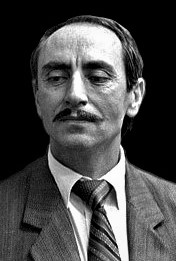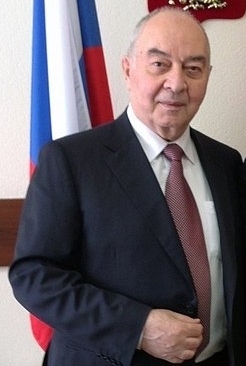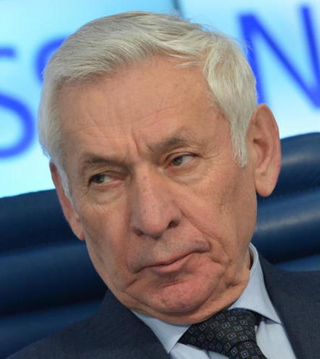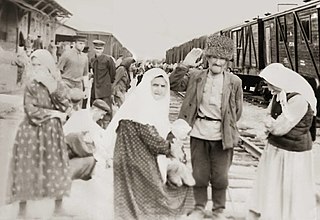
Grozny is the capital city of Chechnya, Russia.

The First Chechen War, also referred to as the First Russo-Chechen War, was a struggle for independence waged by the Chechen Republic of Ichkeria against the Russian Federation from December 11th, 1994 to August 31st, 1996. This conflict was preceded by the battle of Grozny in November 1994, during which Russia covertly sought to overthrow the new Chechen government. Following the intense Battle of Grozny in 1994–1995, which concluded as a pyrrhic victory for the Russian federal forces, their subsequent efforts to establish control over the remaining lowlands and mountainous regions of Chechnya were met with fierce resistance from Chechen guerrillas who often conducted surprise raids.

Akhmat-Khadzhi Abdulkhamidovich Kadyrov was a Russian politician and revolutionary who served as Chief Mufti of the Chechen Republic of Ichkeria in the 1990s during and after the First Chechen War. At the outbreak of the Second Chechen War he switched sides, offering his service to the Russian government, and later became the President of the Chechen Republic from 5 October 2003, having acted as head of administration since July 2000.

The Mountain Autonomous Soviet Socialist Republic or Mountain ASSR was a short-lived autonomous republic within the Russian SFSR in the Northern Caucasus that existed from 20 January 1921, to 7 July 1924. The Mountainous Republic of the Northern Caucasus was created from parts of the Kuban and Terek Oblasts by the indigenous nationalities after the Russian Revolution; however, Soviet rule was installed on this territory after the Red Army conquered the Northern Caucasus in the course of the Russian Civil War, and the former republic was transformed into a Soviet one. The area of the republic was over 73,000 square kilometres (28,000 sq mi), and the population was about 800,000. It comprised six okrugs: Balkar, Chechen, Kabardian, Karachay, Nazran (Ingushetia), and Vladikavkaz Okrug (Ossetia) and had two cities: Grozny and Vladikavkaz. In addition, a special autonomy was provided to the Terek Cossacks: Sunzha Cossack Okrug, which included a large enclave in northern Ingushetia, and a smaller one bordering Grozny. Its boundaries approximated those of classical Zyx.

Dzhokhar Musayevich Dudayev was a Chechen politician, statesman and military leader of the 1990s Chechen Independence movement from Russia. He served as the first president of the Chechen Republic of Ichkeria, from 1991 until his assassination in 1996. Previously he had been a Major General of Aviation in the Soviet Armed Forces.

When the Soviet Union existed, different governments had ruled the southern Caucasus regions of Chechnya and Ingushetia. Within the Mountain Autonomous Socialist Soviet Republic, later annexed into the Russian Socialist Federative Soviet Republic, they were known as the Chechen Autonomous Oblast and the Ingush Autonomous Oblast, which were unified on January 15, 1934 to form the Checheno-Ingush Autonomous Oblast. It was elevated to an autonomous republic as the Checheno-Ingush Autonomous Soviet Socialist Republic from 1936 to 1944 and again from 1957 to 1993. Its capital was Grozny.
Autonomous oblasts of the Union of Soviet Socialist Republics were administrative units created for a number of smaller nations, which were given autonomy within the fifteen republics of the USSR.

Doku Gapurovich Zavgayev is a Soviet and Russian diplomat and politician from Chechnya. He was the leader of the Checheno-Ingush ASSR.

The Republic of Chechnya is a constituent republic and federal subject of the Russian Federation. It is located in the Caucasus region in southwest Russia. It is the political successor of the Checheno-Ingush Autonomous Soviet Socialist Republic. From a centralized form of government during the existence of the Soviet Union, the republic's political system went upheavals during the 1990s with the establishment of the Chechen Republic of Ichkeria, leading to the First Chechen War and the Second Chechen War which left the republic in total devastation. In 2000, following Russia's renewed rule, a local, republican form of government was established in the republic under the control of the Russian federal government.
The Grozny riots of 1958 occurred between 23 and 27 August that year in Grozny. Although beginning as a small-scale event, it turned a major event in the history of the city, of Chechnya and of Russo-Chechen relations, starting a series of ethnic riots, to continue until 1965.
The 1940–1944 insurgency in Chechnya was an autonomous revolt against the Soviet authorities in the Chechen-Ingush Autonomous Soviet Socialist Republic. Beginning in early 1940 under Hasan Israilov, it peaked in 1942 during the German invasion of North Caucasus and ended in the beginning of 1944 with the wholesale concentration and deportation of the Vainakh peoples from their native lands as well as from the locations across the USSR, resulting in the death of at least 144,000 civilians. However, scattered resistance in the mountains continued for years.
Said-Emin Umarovich Dimayev was a Chechen composer. His father Umar Dimayev was a legendary accordionist and folk musician, and his brothers Ali and Valid are professional Chechen musicians.

The deportation of the Chechens and Ingush, or Ardakhar Genocide, and also known as Operation Lentil, was the Soviet forced transfer of the whole of the Vainakh populations of the North Caucasus to Central Asia on 23 February 1944, during World War II. The expulsion was ordered by NKVD chief Lavrentiy Beria after approval by Soviet leader Joseph Stalin, as a part of a Soviet forced settlement program and population transfer that affected several million members of ethnic minorities in the Soviet Union between the 1930s and the 1950s.

Grozny Oblast was an administrative entity of the Russian SFSR that was established as Grozny Okrug on 7 March 1944 and abolished on 9 January 1957.

Bekhan Vakhaevich Agayev is a Russian political figure, deputy of the 6th and 8th State Dumas convocations. He is the son of the politician and entrepreneur Vakha Agaev who in 2004 founded the company Yug-nefteprodukt, that primarily focuses on the wholesale distribution of petroleum and petroleum products and previously played an important role in the export of oil from Chechnya.

Salambek Naibovich Khadzhiyev was a Soviet-Russian Chechen petrochemist, businessman and politician who was the first Chairman of the Government of National Revival of the Chechen Republic. He specialized in the production of low-pour, high-density petroleum fuels transformations of hydrocarbons on zeolite that contain catalysts. He was also the first and only Chechen to hold a ministerial position in the Soviet Union. In 1991, he headed the Ministry of Chemical and Petrochemical Industry of the USSR. During the First Chechen War in 1995 he was the chairman of the Government of the National Revival of Chechnya.
The Chechen Revolution was a series of anti-government protests in the Checheno-Ingush Autonomous Soviet Socialist Republic of Russian Soviet Federative Socialist Republic against the local Communist Party officials.

Magomed Shotaevich Shataev was a Chechen public figure of the Soviet period.

Restoration of the Chechen-Ingush autonomy by decrees of the Presidiums of the Supreme Soviets of the USSR and the RSFSR on January 9, 1957, the Chechen-Ingush ASSR was restored, and within slightly different boundaries than when abolished; Naursky and Shelkovskaya districts with a predominantly Russian population transferred in 1944 from the Stavropol Territory to the Grozny Region remained in its composition, but the Prigorodny District, which remained in North Ossetia, was not returned to it. The area of the republic after the restoration was 19,300 km². At the same time, the Chechen-Ingush population was forbidden to live in the southern mountainous regions of the republic adjacent to the Georgian SSRGo to the section «Socio-territorial changes».
Presidential elections were held in the Chechen Republic on 27 October 1991. At the same time, elections to the Parliament of the republic were also held. The result was a victory for Dzokhar Dudayev.





















